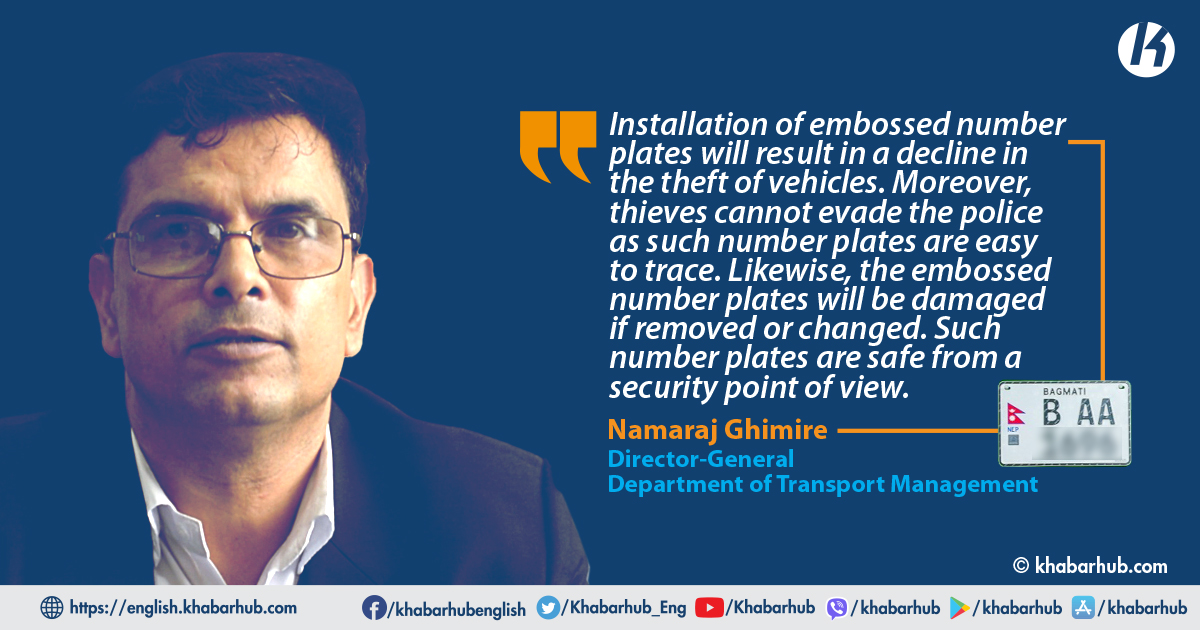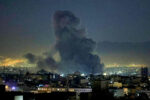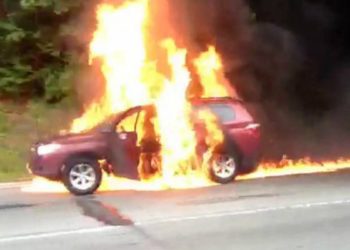KATHMANDU: Criticism mounted in several quarters after the government warned to impose a ban on the vehicles sans embossed number plates.
The decision was widely criticized for forcing all vehicles to have embossed number plates. Embossed number plates are expensive, the number plates cannot be attached to about 2.5 million vehicles in a month and a half, and failure to do so would face action, the government had warned.
In this regard, Khabarhub approached Namaraj Ghimire, Director General of the Department of Transport Management seeking further details about the problems, challenges, and benefits of embossed number plate installation.
Here are the excerpts of the interview:
What is an embossed number plate? How is it different from the old number plate?
The embossed number plates as the name suggests are embossed on the number plate. Unlike ordinary number plates, it is a special type of number plate comprising the digital signature of the authority.
The plate contains all the information about the owner and the vehicle’s status. The number is not written, it is carved on the number plate. If you try to change the number plate, the plate gets damaged.
This makes it impossible to hide the number or change the plate. This is an important issue from a security standpoint.
Similarly, an embossed number plate has a light reflection. Vehicles with embossed number plates can be seen up to 200 meters at night. This is related to safety as one vehicle running on the road is better visible to another vehicle.
Bangladesh, Bhutan, and India, Nepal (BBIN) initiative has been approved by our Parliament. BBIN Motor Vehicles Agreement (MVA) is an agreement on vehicle operation.
BBIN MVA will allow the four countries to ply their vehicles in each other’s countries for transportation of cargo and passengers.
So, our documents show that the embossed number plates should be affixed by the four countries in a mutually understandable manner.
The embossed number plate is more scientific than the old handwritten plate. Vehicles with this number plate can be brought to the central server via a radar drone. You have to look at all the handwritten vehicles in a row.
All information on the embossed number plate can be viewed automatically on the central server.
How many vehicles in Nepal have got embossed plates so far? How much does it cost to install it?
About 25,000 embossed number plates have been attached to the date. Of this, 95 percent is in Bagmati. It has been installed in about 300 vehicles in Gandaki. A large number of them are in government vehicles.
The second is in private vehicles, especially two-wheelers. At present, about 250,000 plates have been produced in the department. The Department of Transportation has enough quantity of it.
According to the agreement made by the company, they should meet our demand. They are ready to do that. We now have 250,000 embossed plates ready.
The company will get around Rs 4.5 billion in revenue by installing embossed number plates on 2.5 million vehicles.
The revenue generated by putting embossed number plates on 2.5 million vehicles is around Rs 7 billion. About 30 percent of the revenue is collected by the Government of Nepal.
About 4.9 million vehicles are registered across the country. There are around 25,000 vehicles with embossed number plates.
That is why it is said that information should be taken out now. Two-wheelers cost from 2500 to 3500 for large vehicles.
We will make arrangements to install 5,000 plates daily across the country to achieve the target of installing embossed plates on 2.5 million vehicles in 15 months.
How long does it take for the applicant to get an embossed number plate?
We realize that embedded number plates are a bit of a hassle. I have been telling the client from the beginning since I joined the Department.
Now you need to apply online. After you apply online, the reference number is generated. The system will print the generated reference number on paper, along with a photocopy of the blue book and the vehicle’s basic information chassis number and engine number for verification at the transport office.
After verification, you are assigned an embossed number. After assigning an embossed number, and assigning biometrics, your vehicle will be identified.
The embossed numbers can be attached in the same place or the designated places. At present, we can do all four things and fix embossed numbers at the transport office in two hours.
For that, all the transport offices should show strong willpower. This means that the verification had to be done in time.
After verification, other work will be done by the company on the same day. Revenue must be paid after verification and personalization. Unlock it gradually
You have to apply online and pay the revenue. For personalization, one should go to DoTM. The system should be generated in such a way that the fitting can be done elsewhere at the customer’s convenience.
The system should be strengthened so as to make the installation effective. The company has to make arrangements for the management of personalization and fitting. Verification is done by the concerned transport management office.
The beneficiaries cannot get the number their desire, the system generates the number. Everyone should use the system-generated number.
How is the former number plate managed?
Since we do not have a vehicle registration system, we have to use the old number to pay the revenue. The revenue collection system is based on the old number.
The embossed number plate is not attached to the VRS system. But we are starting the VRS system from Province 1.
We have been on trial for 6 months from Surkhet in Karnali to Bardibas in Madhesh province. We will be implementing the VRS system which seems to be successful in the trial.
Once the VRS system is implemented, one need not carry the old number to pay the revenue. Revenue can be paid from embossed numbers.
There are complaints that the embossed plate charge is higher in Nepal than in other countries. What’s your response to it?
I do not think I can speak authentically on it. I was not in charge when the agreement was reached. I was not there when the price was determined, the specification was approved and the design was validated, so I cannot speak much about it.
The Embossed Number Plate agreement has not been amended in any way since my arrival. There are issues relating to the size of the embossed plate.
Not everyone has a square number plate on the back of the car. There is also a rectangular size. Our scheme has only the square plate. It doesn’t make sense for me to answer the question of the design as it is something settled during negotiation prior to the agreement.
Many have criticized the DoTM for making embossed number plates mandatory. Shouldn’t embossed numbers be installed voluntarily?
There will be further complications if the embossed number plate installation is made voluntary. Many people might say they want to use their existing number plates.
There should be a point of time to establish a system. You cannot establish a system without setting a deadline.
This is the reason why we said that those who are newly registered after November 17, 2021, and those who transferred the ownership after February 13 or renewed bill books after May 15 should get the embossed number plates installed.
After a, while all vehicles must be embossed. Otherwise, our transportation system would be even more chaotic.
The company DoTM signed the agreement with is said to be on the blacklist of the World Bank. How can a blacklisted company provide quality number plates?
I was not aware of the fact that the company was blacklisted. I read it yesterday. There was no information regarding the blacklist at the time of the agreement.
At the time of the agreement, of course, the company was not blacklisted. An agreement should have been reached on that basis. Our legal provisions do not allow making an agreement with the blacklisted company.
A contract is an important legal document that needs to be reviewed. It is not appropriate to comment on being blacklisted without formal verification of all these issues.
From the application process to the distribution of licenses, DoTM seems to retain middlemen. Why does not the Department come heavily against such groups operating illegally?
I have a different opinion on the word middleman notoriously known as ‘bichauliya’. We have a wrong notion of the mediator or middleman.
They are not ‘bichauliya’, they are like agents. ‘Agencification’ is a common practice prevalent in various parts of the world.
The service recipients are not fully aware of the work being done by the government, they are not literate on the procedures as well.
The government cannot provide everything. In such a situation, it is natural for company people to come. It is in vogue all over the world.
But sadly, we have never been able to think positively about them as middlemen, we have never thought of managing them.
They (middlemen) also forgot their social responsibility and took it as a profession to earn. Intermediaries in transportation should be agencycized.
They should be registered and brought into the legal system. If that happens, the client will get the facility. The market controls how much money the customer has to pay. We can also monitor it.
Intermediaries should be managed. The problem cannot be solved by criticizing them.
Do you have anything to add?
We came to know from the media that embossed number installation notice has brought sensation in the public.
However, there is no need to panic as the issue is not as panicky as depicted by the media. This is not something done in haste. Starting from 2016, we have faced many hard times and addressed them time and again.
The conditions relating to the mandatory embossed numbers apply to the vehicles procured after November 17, 2021.
This is a follow-up of information shared at different times. The monitoring will be done from July 17. We are aware that installation is not possible in just a few days. While monitoring, the traffic police will see whether the people have applied for the embossed number plates or not.
There are around 4.9 million vehicles. We plan to get the embossed number plates installed in 2.5 million vehicles in the next 15 months.









Comment